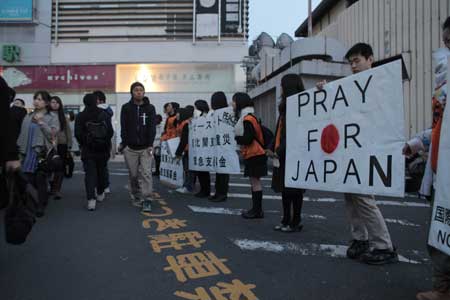New problems cripple Japan's recovery
 |
|
Members of Peace Boat, a Japan-based international NGO, were raising money for earthquake-stricken areas at Shinjuku station in Tokyo on Saturday evening. |
Further lengthening the litany of problems facing Japan, concerns over both safety and tourism are on the rise, and Japanese engineers have reported slow progress at the Fukushima No. 1 power plant, which has been the focal point of a brewing nuclear crisis.
Workers were temporarily evacuated from part of the plant Monday after plumes of smoke rose from the No. 2 and 3 reactors, operator Tokyo Electric Power Co (TEPCO) said.
The number of workers exposed to at least 100 millisieverts of radiation - twice the annual limit for Japanese plant workers under normal circumstances - doubled to 13 from the previous day, the operator added.
Before the smoke appeared, Japan's nuclear safety agency had reported that engineers were close to restoring certain control room functions in reactor No. 2, such as temperature and pressure instruments as well as the air-filtering system.
The agency later admitted that smoke had been seen at the No. 3 reactor, but that the cause remained unknown.
Japanese Prime Minister Naoto Kan said Monday that the country was seeing "slow but steady progress" and praised the engineers who have been working at the risk of their lives, Kyodo News reported.
International Atomic Energy Agency (IAEA) Director-General Yukiya Amano echoed Kan's cautious tone, and he reiterated that the situation at Fukushima remains serious.
Addressing complaints that the UN watchdog had been slow in responding to the crisis, Amano said the criticisms had been based on "widepread misconceptions in the media about the IAEA's role in nuclear safety," AFP reported.
"We are not a 'nuclear safety watchdog,'" he insisted, adding that responsibility for nuclear safety lies with member states.
Meanwhile, the World Health Organization (WHO) joined growing voices of discontent Monday and warned that food and water contamination by radioactive particles released from the Fukushima plant was more serious than previously thought.
"We thought that this kind of problem would be limited to 20 to 30 kilometers. ... (But) it is safe to suppose that some contaminated produce got out of the contamination zone," Peter Cordingley, the Manila-based WHO spokesman for the Western Pacific, told Reuters.
 0
0 







Go to Forum >>0 Comments